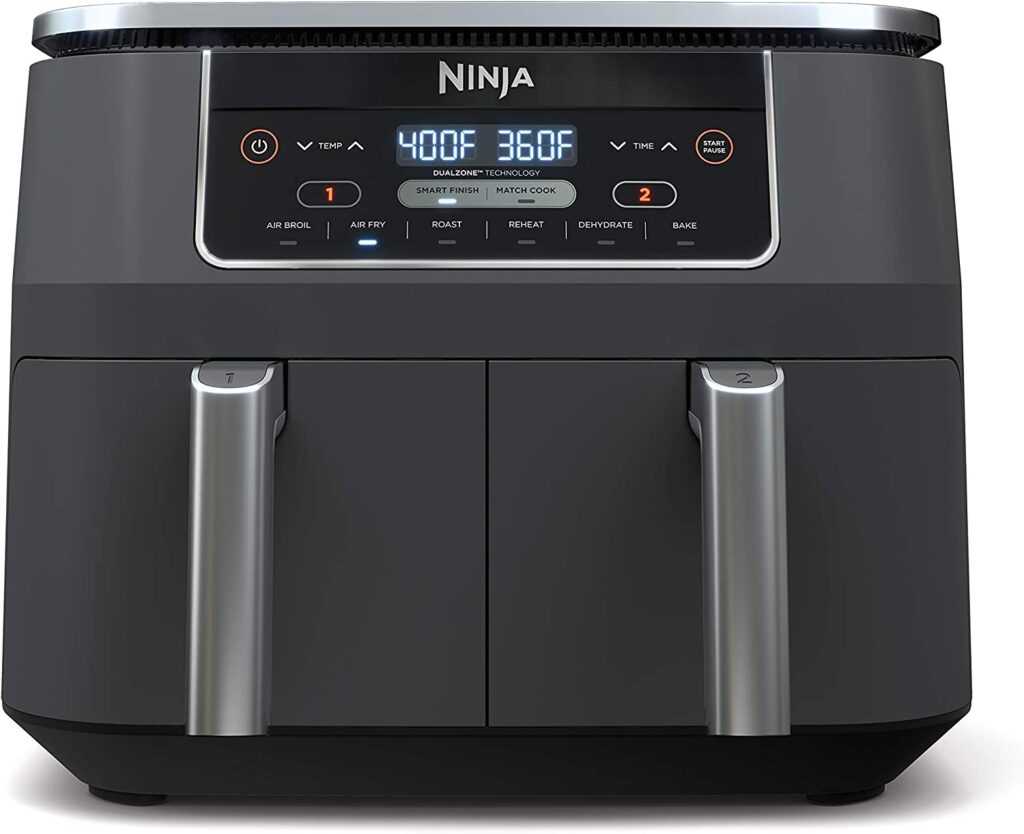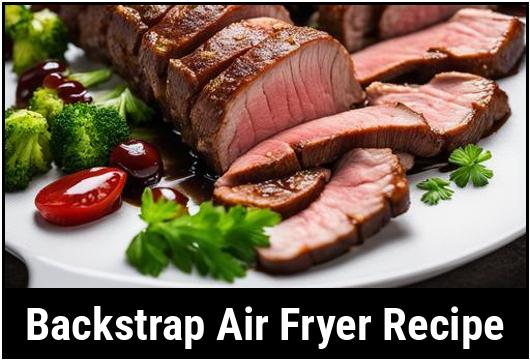
The Art Of Cooking Backstrap In An Air Fryer
The backstrap, also known as the loin or tenderloin, is a tender and flavorful cut of meat from the deer or elk. It is highly prized for its tenderness and is a versatile ingredient in a variety of recipes. Cooking backstrap in an air fryer is a convenient and efficient method, as it results in a succulent and juicy dish with a crispy exterior. In this comprehensive guide, we’ll explore the food science behind cooking backstrap in an air fryer, discuss the selection of ingredients, provide a step-by-step preparation guide, and share a delicious backstrap air fryer recipe.
Food Science Behind Cooking Backstrap In An Air Fryer
Understanding the food science behind cooking backstrap in an air fryer is essential for achieving the perfect texture and flavor. The air fryer works by circulating hot air around the food, creating a crispy outer layer while maintaining juicy and tender meat inside.
When cooking backstrap, it is crucial to achieve the ideal internal temperature for a tender and succulent result. The backstrap is a lean cut of meat, and overcooking can lead to dryness and toughness. With the rapid heat circulation of an air fryer, it is important to monitor the cooking time and temperature carefully to prevent overcooking.
Choosing Ingredients
Selecting high-quality ingredients is key to creating a delicious backstrap dish. When choosing backstrap, look for a fresh, well-marbled piece with a deep red color and minimal connective tissue. Opt for organic, grass-fed backstrap if possible, as it generally offers superior flavor and tenderness.
In addition to the backstrap, you will need a selection of seasonings and aromatics to enhance the flavor of the dish. Common choices include garlic, thyme, rosemary, salt, and black pepper, but feel free to customize the seasonings to suit your taste preferences.
Preparing Ingredients
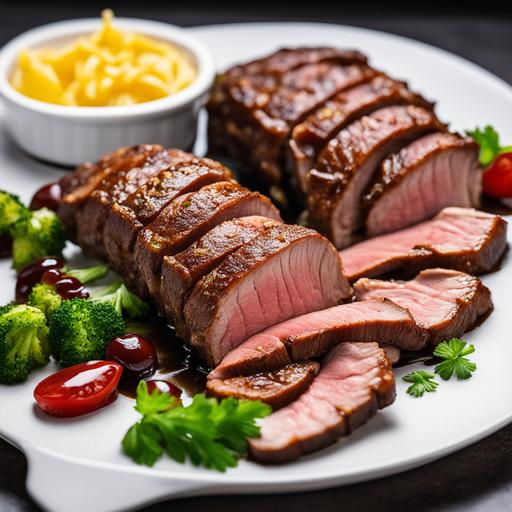
Before cooking the backstrap in the air fryer, it’s important to properly prepare the ingredients to ensure a delicious result.
1. Trimming And Seasoning The Backstrap
- Start by trimming any excess fat and silver skin from the backstrap. Removing these unwanted parts will enhance the tenderness and flavor of the meat.
- Season the backstrap generously with your chosen seasonings. A simple combination of salt, pepper, and minced garlic works well, but feel free to experiment with different herbs and spices.
2. Marinating (Optional)
- Marinating the backstrap can infuse it with additional flavor and tenderize the meat. Consider marinating the backstrap in a mixture of olive oil, balsamic vinegar, and herbs for a few hours before cooking.
Recommended Air Fryer Temperature & Timing
Setting the right temperature and timing is crucial for achieving the perfect cook on your backstrap in the air fryer.
Temperature
- Preheat the air fryer to 400°F (200°C) for about 5 minutes before cooking. This initial blast of heat ensures that the backstrap cooks evenly and develops a crispy exterior.
Timing
- Cook the backstrap for approximately 10-12 minutes for medium-rare doneness, flipping it halfway through the cooking time. Adjust the time according to your desired level of doneness. Keep in mind that the exact cooking time may vary depending on the thickness of the backstrap and the specific model of your air fryer.
Backstrap Air Fryer Recipe
Now that we’ve covered the fundamentals, let’s dive into a delectable backstrap air fryer recipe that showcases the succulence and flavor of this prized cut of meat.
Ingredients
- 1 lb (450g) backstrap
- 2 garlic cloves, minced
- 1 teaspoon dried thyme
- 1 teaspoon dried rosemary
- Salt and pepper to taste
- 2 tablespoons olive oil
Instructions
-
Preparation:
- Preheat the air fryer to 400°F (200°C) for 5 minutes.
-
Trimming and Seasoning:
- Trim the backstrap, removing any excess fat and silver skin.
- In a small bowl, combine the minced garlic, dried thyme, dried rosemary, salt, pepper, and olive oil to create a seasoning paste.
- Rub the seasoning paste all over the backstrap, ensuring it is evenly coated.
-
Marinating (Optional):
- If time allows, marinate the seasoned backstrap in the refrigerator for 2-4 hours to enhance the flavors.
-
Cooking:
- Once the air fryer is preheated, place the backstrap in the air fryer basket.
- Cook for 10-12 minutes for medium-rare, flipping the backstrap halfway through the cooking time.
- For a more well-done cook, increase the cooking time accordingly.
-
Resting and Slicing:
- Remove the backstrap from the air fryer and let it rest for a few minutes before slicing it against the grain into thick, juicy slices.
-
Serving:
- Arrange the sliced backstrap on a platter and serve it with your choice of sides, such as roasted vegetables, mashed potatoes, or a fresh salad.
Cooking backstrap in an air fryer offers a convenient and efficient way to prepare this prized cut of meat. By understanding the food science behind cooking in an air fryer, selecting high-quality ingredients, and following the recommended temperature and timing, you can achieve a perfectly cooked backstrap with a crispy exterior and tender, juicy interior. With the provided backstrap air fryer recipe, you can showcase the natural flavors of this exceptional cut while impressing your friends and family with a delicious and satisfying dish. Enjoy your culinary adventure as you hone your skills in mastering the art of cooking backstrap in an air fryer!
Doneness Checks
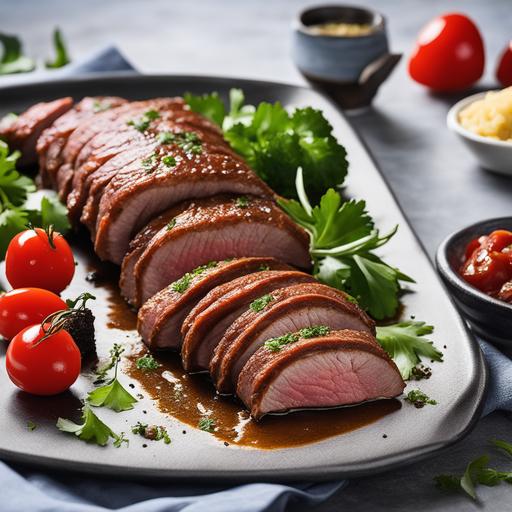
Cooking backstrap in an air fryer is a convenient and delicious way to enjoy this tender and flavorful cut of meat. The air fryer uses hot air circulation to cook the backstrap quickly and evenly, resulting in a perfectly cooked dish with a crispy exterior.
Determining the doneness of your backstrap is crucial to achieve the desired level of tenderness and flavor. Here are some tips on how to check the doneness when cooking backstrap in an air fryer:
-
Internal Temperature: Using a meat thermometer is the most accurate way to check the doneness of the backstrap. For medium-rare, the internal temperature should be around 130°F (54°C), while medium will be around 140°F (60°C). Keep in mind that the temperature will continue to rise a few degrees after removing the meat from the air fryer, so it’s advisable to remove it when it’s a few degrees below your desired level of doneness.
-
Color: Another indicator of doneness is the color of the meat. A properly cooked backstrap will have a slightly pink center for medium-rare and a more pronounced pink for medium. Avoid overcooking the meat to prevent it from becoming dry and tough.
-
Firmness: Gently press the backstrap with your fingers. It should feel firm but still have some give. If it feels too soft, it is likely undercooked, and if it feels very firm, it may be overcooked.
Remember that these guidelines are approximate and can vary depending on the thickness and size of the backstrap. Adjust the cooking time accordingly to achieve your preferred level of doneness.
Undercooking
Undercooking is one of the common mistakes made when cooking backstrap in an air fryer. If you find that your backstrap is undercooked, follow these steps to salvage the dish:
-
Return to the air fryer: If the backstrap is only slightly undercooked, you can return it to the air fryer for a few more minutes. Be careful not to overcook it in the process.
-
Finish in the oven: If the backstrap is significantly undercooked, you can transfer it to a preheated oven set at a moderate temperature, such as 350°F (175°C). Cook it for a few more minutes until it reaches the desired level of doneness. Keep a close eye on it to prevent overcooking.
-
Slicing and searing: Alternatively, you can slice the undercooked backstrap into thick pieces and quickly sear them in a hot skillet for a few seconds on each side. This will help cook the interior while adding a charred flavor to the meat.
Remember, it is essential to properly gauge the doneness of the backstrap before removing it from the air fryer to avoid undercooking it.
Overcooking
Overcooking can lead to dry and chewy backstrap. If you accidentally overcook your backstrap in the air fryer, don’t worry, there are ways to salvage it:
-
Add moisture: Slice the overcooked backstrap into thin strips or cubes and toss them in a marinade or sauce. This will help rehydrate the meat and add flavor. You can use a simple marinade made with soy sauce, honey, garlic, and ginger to infuse some moisture into the meat.
-
Create a sauce: Make a rich and flavorful sauce to serve with the overcooked backstrap. Options include mushroom sauce, peppercorn sauce, or a red wine reduction. The sauce will add moisture and enhance the overall taste of the dish.
-
Pound and tenderize: If the overcooked backstrap is still salvageable, you can pound it lightly with a meat mallet or the back of a heavy pan to break down the muscle fibers. This will help tenderize the meat and make it more enjoyable to eat.
Remember that prevention is better than a cure. Paying attention to the cooking time and using a meat thermometer to check the internal temperature are crucial steps to avoid overcooking the backstrap.
Troubleshooting
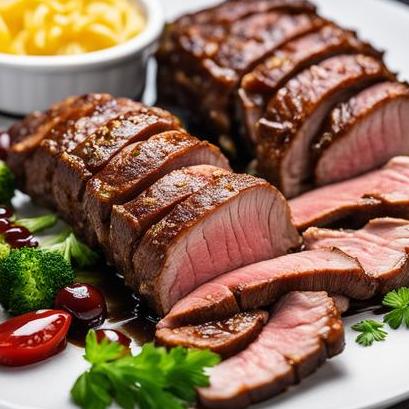
Even with careful cooking, issues can arise when preparing backstrap in an air fryer. Here are some common troubleshooting tips to help you address any problems you may encounter:
-
Uneven cooking: If you notice that the backstrap is cooking unevenly, try flipping it halfway through the cooking process. This will ensure even browning on both sides.
-
Dry exterior: If the exterior of the backstrap becomes too dry, you can brush it with a thin layer of oil or a mixture of oil and melted butter before placing it in the air fryer. This will help retain moisture and prevent the meat from drying out.
-
Burnt exterior: If the backstrap develops a burnt crust, it may be due to the high temperature and extended cooking time. Reduce the cooking temperature slightly and monitor the cooking process closely to prevent burning.
-
Lack of flavor: To enhance the flavor of your backstrap, consider marinating it for a few hours before cooking. Use a marinade that complements the natural flavors of the meat, such as a combination of herbs, garlic, and olive oil.
Recipe Variations
While a simple salt and pepper seasoning can be enough to highlight the natural flavors of the backstrap, there are various recipe variations you can try to add a twist to your air fryer cooked backstrap:
-
Garlic and Herb: Combine minced garlic, chopped fresh herbs (such as rosemary, thyme, and parsley), salt, pepper, and olive oil. Rub this mixture all over the backstrap before placing it in the air fryer. The garlic and herb seasoning will infuse the meat with a delightful aroma.
-
Spicy Cajun: Create a spicy rub by combining paprika, cayenne pepper, garlic powder, onion powder, oregano, salt, and black pepper. Coat the backstrap with this seasoning and let it sit for about thirty minutes before air frying. The Cajun spices will add a kick of heat and robust flavors to the meat.
-
Asian-inspired: Prepare a marinade using soy sauce, ginger, garlic, honey, sesame oil, and a touch of rice vinegar. Marinate the backstrap for at least an hour before cooking. The Asian-inspired flavors will give the dish a savory and tangy twist.
-
Bacon-wrapped: Wrap the backstrap with slices of bacon before placing it in the air fryer. The bacon will help baste the meat and infuse it with its smoky flavor. Ensure the bacon is securely wrapped around the backstrap to prevent it from unraveling during cooking.
Experimenting with different seasonings, marinades, and wraps will allow you to discover exciting flavor profiles that complement the succulent backstrap.
Cooking backstrap in an air fryer is a quick and efficient method that results in a tender and flavorful dish. By following the doneness checks, you can ensure that your backstrap is cooked to perfection each time. In case of undercooking or overcooking, the troubleshooting tips provided in this article will help you salvage the dish and make it delicious. Finally, by exploring different recipe variations, you can add variety and excitement to your backstrap meals. So, fire up your air fryer and enjoy the delightful experience of cooking backstrap with this versatile kitchen appliance!
Flavour Enhancement Tips
Cooking backstrap in an air fryer is a game-changer. The air fryer’s rapid circulation of hot air not only cooks the backstrap quickly and evenly, but it also helps to achieve a deliciously crispy exterior while locking in the juicy tenderness on the inside. Whether you’re a venison enthusiast or simply looking to try something new, this backstrap air fryer recipe is sure to impress.
To make your backstrap truly memorable in terms of flavor, consider marinating it prior to cooking. Marinating not only helps to tenderize the meat, but it also infuses it with delicious flavors. You can experiment with a variety of marinades, such as garlic and herb, teriyaki, balsamic, or even spicy options like chili-lime or jerk. Allow the backstrap to marinate for at least 2 hours, or even overnight, to maximize the flavor absorption.
Another technique to enhance the flavor is to add a rub or seasoning blend to the backstrap. For a simple yet delicious option, try a mixture of salt, black pepper, garlic powder, and smoked paprika. Massage the rub into the meat and let it sit for about 15-30 minutes before air frying.
If you prefer a richer flavor profile, consider wrapping the backstrap in bacon before air frying. The bacon not only adds a hint of smokiness but also helps to keep the meat moist and juicy. Secure the bacon with toothpicks, ensuring that it covers the entire surface of the backstrap.
Texture Enhancement Tips
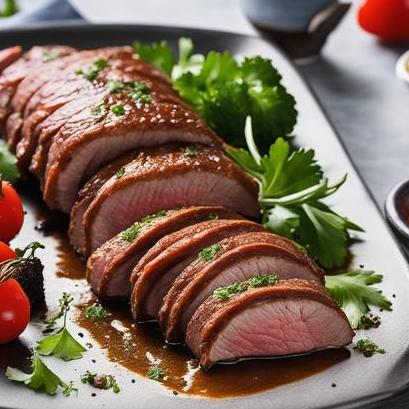
While the air fryer already does a fantastic job of creating a crispy exterior, there are a few techniques you can use to enhance the overall texture of your backstrap.
One technique is to coat the backstrap in a crispy breading before air frying. You can achieve this by dipping the backstrap in beaten egg and then coating it with a mixture of breadcrumbs and your desired seasonings. This will create a delightful crunchy crust that perfectly complements the tender meat inside.
For an extra crispy texture, try a double-coating method. After coating the backstrap, let it rest for a few minutes, and then repeat the breading process. This will create an even thicker and crunchier crust.
If you’re looking for a healthier option, you can also achieve a delicious texture by using a combination of breadcrumbs and crushed nuts, such as almonds or pecans. The nuts will add a delightful crunchiness while adding a layer of richness to the backstrap.
Don’t forget to preheat the air fryer for a few minutes before cooking. This will kick-start the cooking process and promote a crispier exterior.
Cooking At Different Temperatures
The cooking temperature is crucial when preparing backstrap in an air fryer. Different levels of doneness can significantly impact the texture and taste of the meat. Here’s a general guideline for cooking backstrap at various temperatures:
Medium-rare: For a succulent and tender result, cook the backstrap at 375°F (190°C) for 10-12 minutes, or until the internal temperature reaches 130-135°F (54-57°C).
Medium: To achieve a slightly more cooked but still juicy backstrap, cook it at 375°F (190°C) for 12-14 minutes, or until the internal temperature reaches 140-145°F (60-63°C).
Medium-well: If you prefer a more well-done backstrap that is still flavorful and not overly dry, cook it at 375°F (190°C) for 14-16 minutes, or until the internal temperature reaches 150-155°F (65-68°C).
It’s important to note that these cooking times and temperatures are general guidelines and can vary depending on the thickness of your backstrap and personal preference. Always use a meat thermometer to ensure your backstrap reaches your desired level of doneness.
Cooking Tips
To ensure a successful and delicious outcome, here are some additional cooking tips for preparing backstrap in an air fryer:
-
Trim the backstrap: Remove any excess fat or silver skin from the backstrap before marinating or seasoning. This will result in a more tender finished product.
-
Let it rest: After the backstrap is cooked, allow it to rest for a few minutes. This will help to distribute the juices throughout the meat and ensure optimal tenderness.
-
Always use a meat thermometer: For accurate cooking times and to achieve your desired level of doneness, use a meat thermometer to check the internal temperature of the backstrap.
-
Flip halfway through: For even cooking, flip the backstrap halfway through the cooking time. This will help to achieve an evenly browned exterior.
-
Adjust cooking time for thickness: If your backstrap is thicker or thinner than average, adjust the cooking time accordingly. Thicker backstraps may require a few more minutes, while thinner ones may need less time.
-
Experiment with cooking oils: While a neutral oil like canola or vegetable oil works well for cooking backstrap, you can also experiment with flavored oils to enhance the overall taste. Consider using garlic-infused oil or a hint of truffle oil for an extra layer of flavor.
Serving Suggestions
Now that your backstrap is perfectly cooked and full of flavor, it’s time to explore some serving suggestions to complement this delicious cut of meat:
-
Classic pairing: Serve the backstrap with some roasted or grilled vegetables and a side of creamy mashed potatoes for a classic and satisfying meal.
-
Mediterranean twist: Create a Mediterranean-inspired dish by serving the backstrap with a Greek salad composed of tomatoes, cucumbers, onions, feta cheese, and Kalamata olives. Add a side of toasted pita bread and tzatziki sauce for a delicious fusion.
-
Asian fusion: Slice the backstrap into thin strips and serve it over a bed of stir-fried noodles or rice. Add some colorful vegetables and a drizzle of teriyaki or soy sauce for an Asian-inspired twist.
-
Wild game sliders: Turn your backstrap into mouthwatering sliders! Slice the backstrap into smaller pieces, grill them to perfection, and serve on mini buns with your favorite toppings such as caramelized onions, melted cheese, or aioli sauce.
-
Game night appetizer: Slice the cooked backstrap into bite-sized pieces and serve them on skewers as a flavorful and protein-packed appetizer. Offer a variety of dipping sauces like chipotle mayo, honey mustard, or horseradish sauce for added excitement.
Remember, the possibilities are endless when it comes to serving backstrap prepared in the air fryer. Let your creativity shine and pair it with your favorite sides, sauces, and flavors to create a memorable meal.
Conclusion
Cooking backstrap in an air fryer results in a tender yet crispy dish that will have your taste buds begging for more. With flavor enhancement tips such as marinating and seasoning, texture enhancement tips like breading and preheating, and temperature guidelines for achieving various levels of doneness, your backstrap will be perfectly cooked every time. Don’t forget to utilize the cooking tips for trimming, resting, flipping, and using a meat thermometer to ensure the best results. Finally, explore the various serving suggestions to create a meal that suits your taste preferences and delights your guests. Get ready to enjoy a delicious backstrap dish that will elevate your culinary skills and impress all who taste it.
FAQS On Backstrap Air Fryer Recipe
What Is A Backstrap Air Fryer Recipe?
A backstrap air fryer recipe is a cooking method that involves using an air fryer to cook backstrap, which is a cut of meat typically taken from the loin area of an animal, such as deer or pork.
How Does An Air Fryer Work?
An air fryer works by circulating hot air around the food, creating a crispy and golden exterior while cooking the food evenly. It uses a heating element and a fan to quickly and efficiently cook the ingredients.
Why Would I Use An Air Fryer To Cook A Backstrap?
Using an air fryer to cook a backstrap offers several advantages. It allows you to achieve a flavorful and tender result without excessive oil or fats. The air fryer ensures even cooking and browning of the meat, providing a crispy exterior and juicy interior.
What Are The Steps For Cooking A Backstrap In An Air Fryer?
To cook a backstrap in an air fryer, you will typically follow these steps: 1) Preheat the air fryer, 2) Season the backstrap, 3) Place it in the air fryer basket or tray, 4) Set the cooking time and temperature, 5) Cook the backstrap, flipping it halfway through, and 6) Allow it to rest before slicing and serving.
What Temperature And Cooking Time Should I Use For A Backstrap In An Air Fryer?
The temperature and cooking time can vary depending on the thickness of the backstrap and personal preference. However, a general guideline is to cook the backstrap at 375°F (190°C) for about 15-20 minutes, flipping it halfway through the cooking process.
Can I Marinate The Backstrap Before Cooking It In An Air Fryer?
Yes, marinating the backstrap before cooking it in an air fryer can add extra flavor and moisture. It is recommended to marinate the backstrap for at least 30 minutes or up to overnight in the refrigerator. Ensure to pat it dry before placing it in the air fryer to achieve crispiness.
Are There Any Additional Tips For Cooking A Backstrap In An Air Fryer?
Yes, here are some additional tips: 1) Allow the backstrap to come to room temperature before cooking for more even cooking, 2) Make sure the backstrap is not overcrowded in the air fryer to allow proper airflow, 3) Baste the backstrap with melted butter or oil during cooking for added flavor and moisture, and 4) Use a meat thermometer to check for doneness, aiming for an internal temperature of 145°F (63°C) for medium-rare or 160°F (71°C) for medium.

